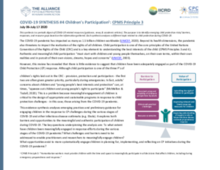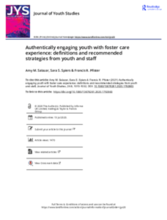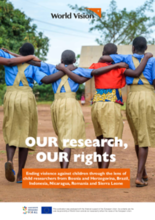Displaying 61 - 70 of 345
This evidence synthesis analyses emerging practices and preliminary guidance for engaging children in the response to child protection (CP) challenges during the various stages of COVID-19 and other infectious disease outbreaks (e.g. Ebola).
The aim of this paper is to describe and analyse the notion of age and maturity in child protection proceedings in order to elucidate how these aspects could influence children's rights to participate.
In this webinar, hosted by Better Care Network and SOS Children's Villages International, panelists - including careleavers who served as co-trainers in the Leaving Care project - discussed the training, building a supportive network for care leavers, and the support needed to ensure that the rights of young people in alternative care are respected and that they are prepared for an independent life.
This article reports on initial research from a survey study to describe the current state of play from practitioners into their perceptions and practices of children's participation in family support contexts.
This study aims to answer two research questions: a) How do youth and staff/professionals define/conceptualize authentic youth engagement (AYE)? and b) What are youths’ and staff/professionals’ recommended strategies for authentically engaging youth?
This study aims to answer two research questions: a) How do youth and staff/professionals define/conceptualize authentic youth engagement (AYE)? and b) What are youths’ and staff/professionals’ recommended strategies for authentically engaging youth? Thirty stakeholder interviews (15 youth, 15 staff/professionals) and 81 surveys (46 youth, 35 staff/professionals) were completed.
This child-led research initiative was conducted under the umbrella of World Vision’s DEAR project (Development Education and Awareness Raising) and the Sustainable Development Agenda 2030. The study explores explore SDG 16.2, the goal that focuses on the issue of ‘abuse, exploitation, trafficking, and all forms of violence against and torture of children’.
This study uses a representative sample of foster youth to investigate youth-level and county-level predictors of youths’ roles in their transitional independent living plan (TILP) development and satisfaction with the care decision meetings.
This paper, by drawing on the different meanings held by documentation in ECEC contexts, in terms of viewing it as ‘equipped with agentic power’ (Alasuutari and Kelle 2015) reflects on the meanings of (pedagogical) documentation in alternative care settings, as a transitional space between ‘being spoken for’ and ‘speaking for oneself’, in light of a rights-based and pedagogical framework.
This systematic review aimed to explore if and how the voices of young people in out-of-home care (OoHC) are represented in research examining their health.



